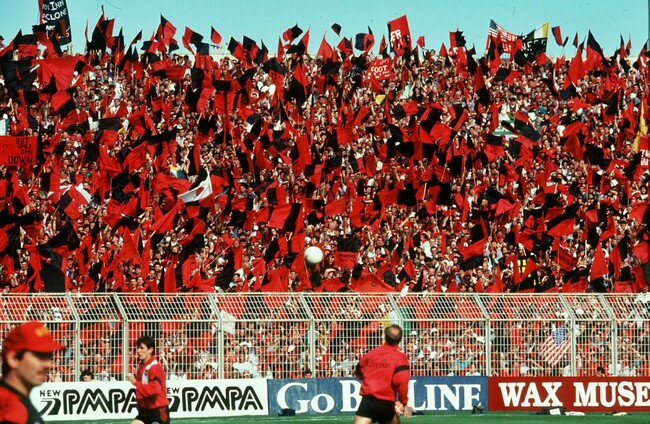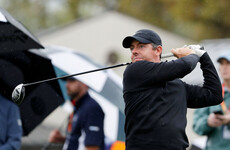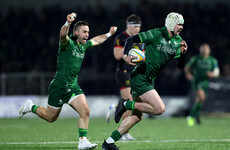This article is the first part of The Cinderella Stories, a series looking at teams who came from nowhere to leave a lasting legacy. Here Pete McGrath and Conor Deegan tell Garry Doyle how All-Ireland glory in 1991 made non-believing counties realise success wasn’t the preserve of the few.
DOWN AND OUT
THE GUN WAS pointed downwards. But still. He was a soldier and we were children. Togged out in yellow jerseys, blue shorts and hand-me-down boots, we hardly posed a security threat as we travelled towards Newry for a match. The truth is the only thing we possessed in our armoury was a 14-year-old who could kick frees off either foot. Dry-mouthed, we fell silent in the back seat of a car as the soldier asked his questions at the checkpoint, his face blackened with paint. Outside the streets were empty, a self-imposed curfew by a population exhausted by the constant tension.
The light was fading on the 1980s and it had long since disappeared out of Ulster. One set of politicians were angry; the other angrier. You only realised the state was a mess when you went some-place else, where policemen didn’t wear a grimace (or a moustache), where resident groups didn’t paint kerbstones red, white and blue, where an army wasn’t on permanent patrol.
Day after day after day, day after day after day – the cycle of news told you about deaths, unemployment and emigration. Then you got to the sports section, the supposed light relief but even here the reading was grim. Eleven times Ulster sent teams to Croke Park for All-Ireland SFC semi-finals in that decade and nine times they lost, Monaghan’s draw with Kerry in ’85, Tyrone’s win over Galway in ’86, the exceptions.
You could say it was a hell of a lot better than the humiliations dished out in the ‘70s. But even so, when the fireworks went off to mark the end of the decade, no one suggested we were at the start of a golden age. Ulster was a political mess; its football teams a symptom of the malaise.
THE ARCHITECT
Not everyone thought that way, though. Pete McGrath was old enough to know Down had a tradition but young enough to realise it was time they built on it. A schoolteacher in St Colman’s, Newry, he’d taken sides from Down to Hogan Cups, Ulster minor championships and an All-Ireland.
He’d sat in the Cusack Stand in 1983 when James McCartan Senior bridged the gap between the ‘60s and the present day, guiding Down to their fourth National League title.
The core of that team – Liam Austin, Paddy O’Rourke, Ambrose Rodgers, Greg Blaney, Mickey Linden – were still around, joined by a quartet of Sigerson Cup winners, DJ Kane, James McCartan Junior, Gary Mason and Barry Breen.
O’Rourke and Brendan McKernan had also won a couple of All-Ireland club titles with Burren while McCartan and Conor Deegan had emerged from McGrath’s ’87 minor All-Ireland side to help Down reach the 1990 National League final. “Poke below the surface and it didn’t take long to realise there was serious talent in the county,” McGrath said. “Like, even though the numbers to emerge from that ’87 minor team were relatively small, the win had a deeper impact than you might imagine. Psychologically, it was a major boost.”
They’d a funny way of showing it, though. Monaghan knocked Down out of Ulster in ’88; Tyrone overpowered them in ’89, Armagh did the same a year later. “There was a perception out there that we were capable of playing attractive football but that bigger, more physical sides could bully and suffocate us tactically,” McGrath says. “And perhaps that perception was true.”
So was another reality. After losing to Tyrone in June 1989, Jackie McManus resigned. Weeks passed. Tyrone won Ulster; Down remained without a manager. Then Tyrone lost to Mayo, who were staring ahead to their first All-Ireland final in 38 years. And still Down’s county board were looking at a blank sheet of paper, their recruitment drive going cold.
There was this one candidate, though. He’d managed the county minors to two Ulsters and an All-Ireland, had coached Blaney, McCartan and a fair few others at St Colman’s. But he’d never done it as a player. Worse than that, he was still only 36. These worried county board men approached him. “Would you go for it, Pete?”
Suddenly the shortlist was down to one – or rather increased to one. McGrath got the gig and immediately arranged a meeting with the senior panel. “Maybe a credibility gap was there initially because of my age and the fact I hadn’t even managed a senior team at club level,” McGrath says. “One or two players did ask, ‘why did I think I had the capability?’ My answer was blunt. I told them how I’d do things, told them about the level of coaching they could expect.”
By the end of that meeting, McGrath had his first victory as Down boss – winning the respect of the dressing room. “Plus, there was another fact,” McGrath said. “These were good players who had flattered to deceive. Time was running out for a fair few of them.”
Things would change, he told them. From now on, Down were going to become a team who stood up for themselves.
THE RUN
It started off in Newry on a grey afternoon in June; it ended up in Leeson Street on a boozy night-cum-morning in September. And along the way there were alarms and scares, a scrappy win over Armagh, a last minute equaliser against Derry, a collective coming of age against Donegal and the slaying of a legend by a rookie. And then there was Meath, battle-hardened, unbeatable Meath.
At some stage that summer a sleeping giant opened its eyes. The only question is when. For McGrath, that’s an easy answer. “The crucial moment in our whole season was 9 June,” McGrath says. “Not winning an Ulster title for the first time in a decade; not beating Kerry in the All-Ireland semis; not even (the All-Ireland final win over) Meath. “No, beating Armagh by two points on a horrible wet day, in a nervy, unattractive game, that was the key one. A burden was gone. We were up and running.”
Or rather they were up and hobbling. O’Rourke, the captain, played poorly against Armagh and was substituted; Liam Austin, the first-choice midfielder for 14 years, was injured for the Ulster semi-final replay. But McGrath was inventive.
Peter Withnell had dabbled with football as an 11-year-old, parked it for a bit, took it up again when he was 15 but had stayed so far under the radar that even McGrath hadn’t heard of him until he got a phone call from a friend in September 1990.
There was this kid who’d come back from England, he was told. Across the water, Withnell had made the bench for London’s All-Ireland Junior final after going on trial with Reading FC. “We’ll take a look,” McGrath said.
He liked what he saw, liked it even more when Withnell scored 2-2 against Armagh in the League and by the time he relocated Ross Carr and Gary Mason from the half-back line to the half-forwards, the team was taking shape. “We needed ballwinners in our forward line,” he says.
Suddenly they had three of them. The next adjustments came at midfield. Austin had been a great player but was getting on a bit. Injured for the Ulster semi-final replay against Derry, McGrath moved Breen from the full-back line to midfield. It proved a more suitable home.
O’Rourke, meanwhile, responded well to being subbed. “Paddy had a very strong mentality,” McGrath says. “He had no gripes whatsoever about my decision and was more than able to handle a bit of adversity.”
They all were. “There were huge personalities in that dressing room,” Deegan says. “Seriously driven men, good footballers but big characters, too.” Ross Carr was one. Against Derry, in the drawn game, they blew a big lead, needing Carr to bail them out with a last-minute free. The replay was won with five points to spare, the Ulster final won by eight. The following Sunday, Kerry manager Mickey Ned O’Sullivan told The Sunday Press that no team in the country had played as well that year as Down.
“If the players saw that quote, well they kept it quiet,” McGrath says, “because I certainly didn’t see the need to bring it to their attention. By that stage, they didn’t need to hear from any outsider about how good they were. They knew it themselves.”
That didn’t stop outsiders having their say, though. They pointed to history. Since 1968, Down’s previous All-Ireland win, only two Ulster teams – Armagh in 1977, Tyrone in 1986 – had won an All-Ireland semi-final. In the same timeframe, the team they were facing, Kerry, had won nine All-Irelands and eight National Leagues.
We just didn’t have an inferiority complex, being from Down,” Deegan, then a 21-year-old full back on that team, says. “It wasn’t that we didn’t respect Kerry because we did. But everyone in our dressing room knew someone who’d won All-Irelands in the ‘60s. A couple of the lads had fathers and relatives on those teams. We’d enough self-respect to just focus on what we had to do.”
In any case, the old boys were a tired team. Pat Spillane wasn’t as quick, Jack O’Shea as influential. At the back, Tom Spillane – four-time All-Ireland winner, three-time All Star – was making his first appearance of the year. But he was fighting out of his era. Withnell, eight years younger, was getting better; Spillane getting older.
And so it proved. Time and time Withnell got the better of Spillane that day; three times he scored, twice for goal, once for a point. Down should have won by more, Linden missing a penalty, Blaney hitting the bar when he was one-on-one with Charlie Nelligan.
Yet the former champs resourced a few tricks from their tattered scrapbook and had chances of their own. “At different stages that day, I’d to mark Maurice Fitzgerald, Pat Spillane and Jacko,” Deegan says. “Don’t tell me it was an easy win; it wasn’t. Neil Collins had to make a crucial save when they were on top.”
Still the Down defence restricted Kerry to just eight points.
Imagine.
The win brought a swagger to the side and the whole entire county. You could tell an area’s allegiance by its kerbs. Pockets of unionism were painted red, white and blue; but the red and black coloured pavements in villages and towns reminded you this was a football county, champions in ’60, ’61 and ’68. After so long in hibernation, they were on the march again. The question wasn’t whether they’d be stopped. The question was where could you source a ticket?
THE FINAL
They kept knocking on his door. Night after night they came, begging for a ticket. We heard the stories each day, the pressure one of our own was under, a county board official from our village who had all these strangers coming to his house, seeing if he could sort them out.
It was that sort of summer, one that began with just over 9,000 people in Newry for the win over Armagh and ended with tales of a queue stretching onto the street outside this administrator’s home.
“We’d 75 of them (tickets) in our house,” Deegan says. With three brothers on the squad, the Deegans received 25 each. “You could escape the hype. Like it was a long five weeks between the semis and the final but we just didn’t let it get to us.”
Nothing could. Even Meath, champions in ’87 and ’88, finalists the year before, survivors of the four-game epic with the Dubs, couldn’t live with them in a golden 28-minute spell either side of half-time, when Down outscored ‘the team that couldn’t be beaten’ 1-9 to 0-1.
“Big Withnell had shouldered (Mick) Lyons and (Liam) Harnan,” Deegan remembers. Both men felt the effects.
Lyons went off; Robbie O’Malley never made it on, a broken leg ending his summer in the Leinster final. Suddenly there were holes in that famed old Meath defence and Down had the players to exploit them. Doubt, fear – it wasn’t visible. “What helped was the fact we’d been beaten by Meath the year before in the National League final,” McGrath says. “Like, we could have won that game but we gave them too much respect. It was a case of us being in Croke Park, they being Meath, us being nobodies.”
We can’t allow that happen again,” McGrath told them one night in training. “Youse going to let them do the same thing to us this time?”
“No f***ing way,” was the answer.
Outside the world didn’t listen. The one and only Sean Boylan had worked his magic again. He had Stafford, O’Rourke and Flynn – although O’Rourke had flu and had to be benched.
“There was a respect for them, yes, but we had good players of our own,” Deegan says. “We knew we were ready.”
McCartan certainly was. He kept trying outrageously difficult shots in that final, and kept knocking them over. Linden, Eamon Burns, Blaney and Carr were the support-cast, Withnell, Blaney, McCartan and Linden involved in the rat-a-tat-tat passing move that led to Barry Breen’s goal. At one point, Down led by 11 before Meath’s staged their habitual late comeback, cutting the gap down to two before ref, Seamus Prior, blew his last whistle of the day.
And so, for the first time since The Troubles began, Sam Maguire was heading north.
THE FALL-OUT
A lot was made of the fact Meath played 10 games. But it wasn’t our fault Wicklow took them to a replay.”
Those are Conor Deegan’s words.
It is All-Star night, 1991. The names are called out. Meath get six awards, Down four. That Sunday, a columnist writes that this was proof Meath should have won the 1991 All-Ireland.
“To get only four All-Stars was derisory,” Deegan said. “I opened my big mouth and said as much. A Meath player pointed out that I was lucky to get one myself. And I knew it. I was lucky. But Neil Collins wasn’t just unlucky. He was hard done by.
“All-Irelands are won on big moments. At key points of the semi-final and final, Neil saved certain goals. In the drawn game against Derry, he stopped a certain point. If it wasn’t for those moments, we’d never have won the All-Ireland. Even to this day, I don’t think the ’91 team ever got credit for what they achieved.”
THE LEGACY
They left a legacy, though – Down’s All-Ireland in ’91 followed up by Donegal’s in ’92. A year later, it was Derry’s turn. Along the way, there were other stories, other breakthroughs: Clare’s footballers won their first Munster title for 75 years in 1992. Three years later, the county’s hurlers captured a first provincial title since 1932 and a first All-Ireland since 1914.
The domino effect continued, Wexford citing Clare’s success as an inspiration for their own day in the sun in ’96. Plus you had Leitrim in ’94, Offaly’s footballers in ’97, Kildare and Galway in ’98, Armagh in ’99 – each ending droughts. There’s never been another decade like it in the history of the GAA.
“You can read too much into it,” Deegan suggests, “like I think it’s a bit of a stretch to suggest we had any influence over the Wexford hurlers.”
And yet Deegan knows – from contacts of his – that Clare’s footballers looked at what Down achieved in ’91 and decided to replicate their training. A few Clare’s hurlers referenced their footballers win in ’92 as a factor in that later breakthrough. “The shockwaves can filter out beyond your county’s borders, no doubt about that,” McGrath says. “The fact we had come from nowhere – you could argue – gave other teams who had talented players the belief that they could do it. Certainly there is no doubt Donegal and Derry looked at our victory and said, ‘well if they can, then we can’.”
One team who definitely took inspiration from Down in ’91 was Down …… in ’94. “Winning a second All-Ireland was vindication for us,” Deegan says. “We were fed up hearing we were a lucky team.”
We were hearing far too much of Roxette and Mariah Carey in the early hours of Monday morning after that ’91 All-Ireland, the allure of Leeson Street proving far too tempting to a group of thirsty teenagers from Down.
The next day there was a gentler sound coming at us as we headed back north, crossing the border. Another army checkpoint, another soldier, another round of questioning.
“Good night out,” he asked, his Brummie accent stretching each syllable into a sentence.
“Was some win alright!”
“So does this mean you’ve qualified for Europe, then?” the solder asked.
If anything summed up that crazy summer, it was that.














Keeping down the wage bill , he wasn’t getting near the team and they are trying a different approach imo
@Tricksy: haha what approach?
Other than CR7 who have united made money on.
They give away their players for virtually nothing
@Mark Smith: Danny Welbeck.
@Aimoo:
They stole £15m off Arsenal for him. To think they only paid them £20m for Van Persie.
@Mark Smith: every youth team player they’ve ever sold. Think you’ll find thsts quite a few too.
@Mark Smith: there are plenty, Beckham, van Nist, Heinze , Hernandez to name a few more
How can they only get 1.5 million for him? He’s a good player …. gotta be worth 15/20 million United and In fact all other English teams always get shafted when the European clubs buy their players.
@Davedental: lol
I heard a man on a phone in radio show blaming Brexit for this very reason
@Davedental: last year of his contract, its know hes not wanted in the squad and the player himself was on wages that mean United save about 3million alone in them plus the extra 1.5 , overall the best move for all involved
Bahahahahaha Manchester United